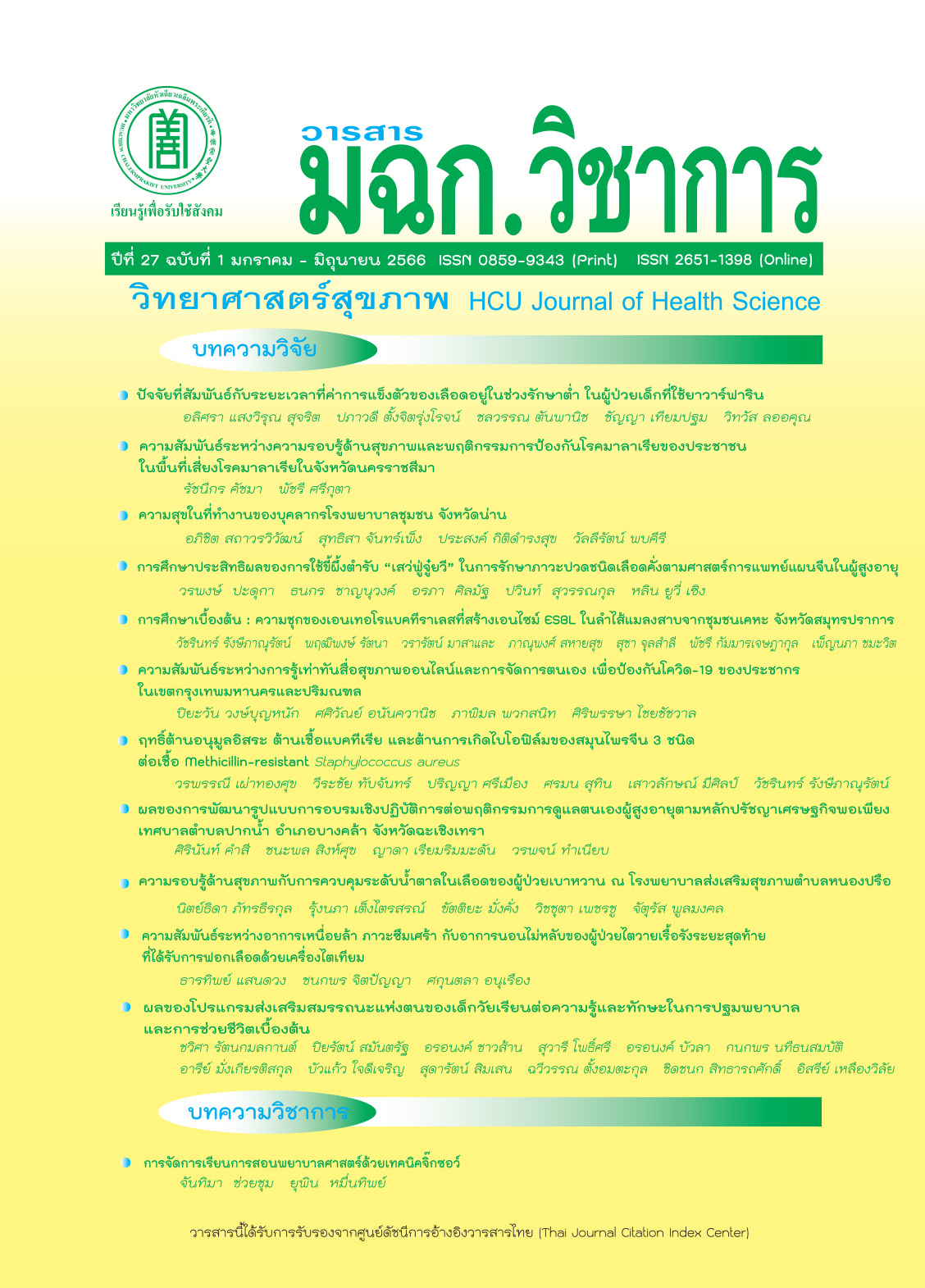The Relationship between Health Literacy and Malaria Prevention Behaviors of People in Malaria Risk Areas in Nakhon Ratchasima Province
Keywords:
health literacy, malaria prevention behaviorAbstract
This cross-sectional analytical study aims to study health literacy in malaria prevention, malaria prevention behavior and the relationship between health literacy in malaria prevention
and malaria prevention behavior of people in risk areas. The samples used in the research were people in risk areas of Nakhon Ratchasima province. A total of 385 people came from cluster
sampling and simple random sampling, and data collection was by questionnaire. Data were analyzed using descriptive statistics and multiple logistic regression analysis with enter method.
The results showed that most of the samples had insufficient levels of health literacy in malaria prevention at 89.1% and inappropriate levels of malaria prevention behavior at 70.9%.
After controlling the confounding factors, the results also show that health literacy in malaria prevention was significantly associated with malaria prevention behavior (P-value <0.001). The sample with sufficient health literacy in malaria prevention has up to 4.095 times more proper malaria prevention behavior than a sample with insufficient levels of health literacy in malaria
prevention (95% CI = 2.067-8.115).
Downloads
References
Kumbanchat Y, Jirapornkul C, Tungsrithong N. Factors in association with malaria infection in Phu Phan district Sakon Nakhon province, Thailand. KKU Journal for Public Health Research 2015:8:57-64.
World Health Organization. Malaria facts & statistics [Internet]. 2021 [cited 2564 Sep 5]. Available from: https://www.who.int/news-room/fact-sheets/detail/malaria
Division of Epidemiology Department of Disease Control. Malaria situation [Internet]. 2022 [cited 2022 March 19]. Available from: http:/doe.moph.go.th/surdata/disease.php?ds=30
Department of Disease Control, Division of Infectious Diseases. Malaria online [internet]. 2022 [cited 2022 March 19]. Available from: http://malaria.ddc.moph.go.th/malariaR10/index_newersion.php
Department of Disease Control, Bureau of Communicable Diseases. National malaria elimination strategy, Thailand 2017-2026. Bangkok: Aksorn graphic and design; 2016.
Jampajan J, Tansuk W. Knowledge and personal behaviors of malaria prevention among people in Phuphan Ddstrict Sakonnakhon province. The 37th National Graduate Research Conference; 2015 December 18 . Chaing Rai Chiang Rai Rajabhat University; 2015. p. 562-70.
Samruayruen K, Kitreerawutiwong N. Understanding on assessing health literacy. EAU Heritage Journal Science and Technology 2018;12(3):1-13.
Department of Health Service Support Ministry of Public Health, Division of Health Education. Promoting the development of knowledge about happiness and health behaviors guidelines for implementation of health education and health behaviors, fiscal year 2018. Nonthaburi: Public Health Education Division, Ministry of Public Health; 2018.
Photihung P. Relationship of health literacy to health promoting and disease prevention behaviors in Thailand: a systematic review. The Journal of Faculty of Nursing Burapha University 2021;29(3):117-30.
Hsieh FY, Bloch AD, Larsen MD. A simple method of sample size calculation for linear and logistic regression. Statistics in Medicine [Internet]. 1998 [cited 2021 May 7];17:1623-34. Available from: https://doi.org/10.1002/(SICI)1097-0258(19980730)17:14<1623::AID-SIM871>3.0.C0;2-S
Suwannakanya R, Suggaravetsiri P. Factors associated with patient's delays of treatment among new smear positive pulmonary tuberculosis patients in Nakhonratchasima province. KKU Journal for Public Health Research 2013;6(3): 66-74.
Department of Health Service Support Ministry of Public Health, Division of Health Education. Health literacy and health behavior assessment report 2018 [Accessed on 5 July 2021]. from: http://www.hed.go.th/linkHed/364
Konsnan W, Poum A. Health literacy associated with preventing and controlling behavior of dengue hemorrhagic fever among village health volunteers in Nong Yai sub-district, Prasat district, Surin province. Journal of Health Science and Community Public Health 2020;3(3):35-44.
Punsrigat Khongjaroen K, Nakaphong N. Health intelligence and health promoting behaviors and disease prevention of the elderly in Muang district, Phayao province. Jounal of Social Academic School of Social Sciences Chiang Rai Rajabhat University 2019;12(2):239-47.
Ozdemir H, Alper Z, Uncu Y, Bilgel N. Health literacy among adults: a study from Turkey. Health Educ Res 2010:25:464-77.
Levy H, Janke A. Health literacy and access to Care. J Health Commun 2016;21:43-50.
Bodur AS, Filiz E, Kalkan I. Factors effecting health literacy in adults: a community based study in Konya, Turkey. International Journal of Caring Sciences 2017;10:100-9.
Pradit P, Mongkolsomlit M, Sumpowthong K. Meta-analysis of factors associated with malaria prevention behavior based on the health belief model. Journal of Health Science Research 2016;2(10):92-104.
Maneedang P, Rongmuang D, Thongphet P, Sridowruang P. Lifestyle, lack of knowledge, beliefs and wrong health behavior cause malaria among Burmese workers in Saidang sub-district, Muang Ranong. The Southern College Network Journal of Nursing and Public Health 2016:3:77-93.
Parker RM, Baker DW, Williams MV, Nurss JR. The test of functional health literacy in adults. J Gen Intern Med 1995;10:537-41.
Downloads
Published
How to Cite
Issue
Section
License
Copyright (c) 2023 HCU Journal

This work is licensed under a Creative Commons Attribution-NonCommercial-NoDerivatives 4.0 International License.
บทความที่ได้รับการตีพิมพ์เป็นลิขสิทธิ์ของวารสารวิทยาศาสตร์สุขภาพและสุขภาวะ
ข้อความที่ปรากฏในบทความแต่ละเรื่องในวารสารวิชาการเล่มนี้เป็นความคิดเห็นส่วนตัวของผู้เขียนแต่ละท่านไม่เกี่ยวข้องกับมหาวิทยาลัยหัวเฉียวเฉลิมพระเกียรติ และคณาจารย์ท่านอื่นๆในมหาวิทยาลัยฯ แต่อย่างใด ความรับผิดชอบองค์ประกอบทั้งหมดของบทความแต่ละเรื่องเป็นของผู้เขียนแต่ละท่าน หากมีความผิดพลาดใดๆ ผู้เขียนแต่ละท่านจะรับผิดชอบบทความของตนเองแต่ผู้เดียว




